GARDA HALL (1900 - 1968)
Today South African soprano, Garda Hall, is hardly remembered in South Africa where she was born, or in the United Kingdom where she lived for most of her life and had a distinguished career as a singer. The only reason why I know anything about Garda Hall at all is that Webster Booth mentioned that he had sung and recorded with her on several occasions. Her descendant, Quentin Hall, who lives in Western Australia, has shared some of his extensive family research with me so I thought I would write a short article about his distinguished ancestor. I am interspersing the dates of some of her broadcasts, thanks to the BBC Genome Project.
Garda Hall was born in Durban, Natal in 1900 in the middle of the South African War. Garda was given the unusual middle name of Colenso, presumably in commemoration of the Battle of Colenso in 1899. Her parents were George Ernest Hall (1869 – 1933), originally from Torquay, Devon, and Maude Kate Amy Breeds (1878 – September 1959). Quentin presumes that George and Maude married in South Africa rather than the UK and the Breeds surname suggests to me that Garda’s mother was a South African of Dutch origin, rather than British.
Garda moved from Durban to Pietermaritzburg when she was seven years of age and attended the private Girls’ Collegiate School there. Her father owned a bicycle shop in Pietermaritzburg called Hall’s –The Cycle Specialists and sold it to renowned cyclist, Walter Jowett when the family settled in England. The cycling business remained Hall’s - The Cyclist Specialists until 1952 when Walter eventually changed the name of the business to Jowett Brothers.
Garda was not noted for her musical prowess at school. Apparently the music teacher told her that she was singing out of tune and asked her to leave the music class! It should be pointed out that some children who sing out of tune begin to sing in tune as they mature. Despite being good enough to be accepted at the Royal Academy of Music in 1920 and doing well there, several critics remarked on occasional lapses of intonation when she became a professional singer.
In 1920, she boarded the Norman Castle in Durban with her mother, who was 41 at the time.
They arrived in Southampton on 9 August 1920 and Garda began her vocal studies at the Royal Academy of Music in London at the beginning of the new term in September, taking lessons with the renowned singing teacher, Frederick King who trained many notable singers including Norman Allin, Miriam Licette, Carmen Hill and Robert Radford. T. Arnold Fulton, the Scottish organist and choral director of the London Select Choir and the choir at St Columba’s Church in London where he was organist and choir master, acted as studio accompanist to Frederic King at the Royal Academy. Some years later Arnold Fulton moved to South Africa and taught singing based on the methods he had learnt from Frederic King.
Garda obtained the diplomas of ARAM and LRAM. Interestingly, she apparently trained as a mezzo soprano at the Academy, yet sang as a lyric soprano during her subsequent career as a singer. She was awarded the Gilbert Betjemann Gold Medal at the Academy for operatic singing in 1923.

Not long after she graduated, she sang at the first Grand Ballad Concert of the season at the Guildhall, Plymouth on 29 September 1923, and in 1925 she made a triumphant return to Pietermaritzburg and Durban and gave several successful recitals while she was there. The closing item which she sang at the Pietermaritzburg concert was Poor Wand’ring One from The Pirates of Penzance. I wonder what her disapproving music mistress at ;the Collegiate School thought about this! If she had left South Africa as a second-rate, sometimes out of tune mezzo, she had returned to the country of her birth as an engaging lyric soprano. At the time of her trip her parents were living in Winkelspruit on the South Coast of Natal, but by 1930 the whole family moved to 137 King Henry’s Road, South Hampstead, the address where Garda remained until her death in 1968.
Towards the end of that year Garda sang in Burnley in aid of the Police Convalescent fund. Two of her fellow artistes were distinguished singers of the day - Muriel Brunskill (contralto) and Tudor Davies (tenor). At a concert the following year, the critic remarked on her clean-cut articulation (in English and French) and her ability to sing a comfortable high E. However, he disapproved of “an almost continuous vibrato which adversely affected her intonation”. He suggested that she should work on her breathing to correct this fault – shades of that music mistress in Pietermaritzburg!
1926 was an auspicious year for Garda as she began recording for His Master’s Voice (HMV). One of her notable recordings was the Mozart Requiem with the Philharmonic Choir and orchestra, conducted by Charles Kennedy Scott on 6 July at the Queen’s Hall.Other singers on the recording were Nellie Walker, Sydney Coltham and Edward Halland.She was also bridesmaid at the wedding of baritone Roy Henderson and Bertha Smyth in March. The couple had met when studying at the Royal Academy, presumably at the same time as Garda herself. Garda often appeared in concerts with Roy Henderson in the twenties and thirties. Roy Henderson began teaching singing in 1940 and is renowned as the teacher of Kathleen Ferrier.
Baritone Roy Henderson (1899 - 2000)
Here is a link to Roy Henderson singing
Sylvia by Oley Speaks.
http://youtu.be/PKwpcTvMO6U



AFTERNOON CONCERT - 2LO London, 13 August 1927 15.00 THE WINNING BAND OF THE METROPOLITAN POLICE FESTIVAL (1927) THE BAND OF A DIVISION, WHITEHALL (Conducted by A. H. DUNLOP , late Scots Greys) GARDA HALL (Soprano). Richard FORD (Baritone), LILLY PHILLIPS ('Cello)
During the twenties, Garda was making a name for herself as a popular concert singer, recording artiste and broadcaster, although critics were still concerned about her violent vibrato and doubtful intonation as opposed to her vocal good points of agility and wide range. She was singing with the finest singers of the day, as can be seen in this article of 1928:
An Orchestral Concert - 5GB Daventry (Experimental), 15 January 1929 16.00 (From Birmingham) THE BIRMINGHAM STUDIO ORCHESTRA - Conducted by FRANK CANTELL.GARDA HALL (Soprano).
A BRASS BAND CONCERT - 2LO London, 25 May 1929 15.30 S.B. from Newcastle. Artists from the London Studio: GARDA HALL (Soprano), WATCYN WATCYNS (Baritone).
The MARSDEN COLLIERY BAND Conducted by JACK BODDICE.
Relayed from the Spa S.B. from Hull.GARDA HALL (Soprano)
On 6 March 1930 Webster Booth was establishing himself on record, radio, as the Duke of Buckingham in the West End production of The Three Musketeers, and as a tenor soloist in oratorio, but he was still entertaining at dinners and benefit concerts, such as one at the Finsbury Town Hall for the Clerkenwell Benevolent Society, where South African soprano, Garda Hall was one of the other entertainers. Charles Forwood, who was to become the permanent accompanist of Anne Ziegler and Webster Booth when they went on the variety stage in 1940, accompanied at this concert.
Charles Forwood is seated at the piano, accompanying Webster Booth and Anne Ziegler in the 1940s.
A newspaper cutting on 20 March 1930 reads as follows: The Clerkenwell Benevolent Society benefited to a considerable extent as a result of a concert at the Finsbury Town Hall on March 6. There was a generous provision of talent, among those to please a large and enthusiastic audience being Garda Hall, Doris Smerdon, Gladys Limage, Doris Godfrey, Hilda Gladney Woolf, Maidie Hebditch, Webster Booth, Ashmoor Burch, Charles Hayes, Fred Wildon and Lloyd Shakespeare, with Charles Forwood as accompanist. It is interesting that some of these names are still remembered today, while others are completely unknown.
Old Finsbury Town Hall.
Conducted by B. WALTON O'DONNELL, GARDA HALL (Soprano)
A Cowen Programme - THE B.B.C. ORCHESTRA Conducted by JOSEPH LEWIS.
GARDA HALL (Soprano) and Orchestra Aria, Bloom on, bloom on, my Roses (The Rose Maiden) The Swallows, Cradle Song, A Birthday.
Later in that year, Garda returned to South Africa and her parents came to England on board the Gloucester Castle to make their home with her. For a short time they lived at 142 King Henry’s Drive, Hampstead, but later moved to 137 King Henry’s Drive, where she remained until her death in 1968.

GARDA HALL (Soprano), DALE SMITH (Baritone), THE B.B.C. ORCHESTRA
Conducted by PERCY PITT
A Concert 5WA Cardiff, 20 March 1931 19.45 Relayed from THE Public HALL, BRITON FERRY. GARDA HALL (Soprano), JOHN MOREL (Baritone) BRITON FERRY I.L.P. MALE VOICE PARTY,Conducted by D. L. MORGAN.
NATIONAL ORCHESTRA OF WALES (Cerddorfa Genedlaethol Cymru) (Leader, LOUIS LEVITUS)
Conducted by WARWICK BRAITHWAITE
Songs by GARDA HALL (Soprano), WILLIAM JONES and his Banjo, A Tale of Spain and the Rolling Main, by ROBERT ASCROFT.
In May 1932 Garda made a 12 inch recording of Musical Comedy Gems (1) and Musical Comedy Gems (2) with George Baker (C2412) of songs from The Chocolate Soldier, The Desert Song, Rose Marie and The Merry Widow.
George Baker and Garda Hall
In March 1932 Garda took part in a broadcast of popular opera with another South African singer who had made a career in the UK, the contralto Betsy de la Porte. In the same year she sang in a concert devoted to Viennese music at the Pump Room in Bath. The conductor was Edward Dunn, and baritone George Baker, Webster’s great friend and mentor, was the other soloist. Several years later, Garda suggested to Edward Dunn that he should apply for the position of musical director of Durban Opera. He was chosen from 200 candidates and remained in South Africa for the rest of his life. The last I heard of him was when he was conducting the Johannesburg Philharmonic Society and giving lectures on musical appreciation in the sixties.
GARDA HALL, PARRY JONES, FOSTER RICHARDSON.
EDGAR LANE (Compere)
WALTER RANDALL (Pianist)
THE REVUE CHORUS and The B.B.C. THEATRE ORCHESTRA Leader, S. Kneale Kelley.
Conducted by JOSEPH LEWIS
Scenes from Verdi, Humperdinck and Flotow.
Produced by GORDON MCCONNEL.
Garda Hall (Soprano), Betsy de la Porte (Contralto), Jan Van Der Gucht (Tenor), Stuart Robertson (Baritone), Franklyn Kelsey (Bass), Mary Hamlin (Soprano), Gladys Winmill (Contralto), Doris Owens (Contralto), Rosalind Rowsell (Soprano) , Stanley Riley (Bass), Bradbridge White (Tenor), Victor Utting (Bass).
Narrator, Ivan Samson
The Wireless Chorus (Section B) - Chorus-Master, Cyril Dalmaine.
B.B.C. Orchestra (Section D) - Led by Marie Wilson
Conducted by Stanford Robinson
Conductor - STANFORD ROBINSON, GARDA HALL (Soprano)
On 22 May 1933, Frederic King, Garda’s singing teacher at the Academy, died at the age of 80, and on 1 October of the same year, .Webster was on the same bill as Garda Hall at the Palladium. Other performers on that bill were Debroy Somers and his band, Leonard Henry (compère), Raie da Costa (the brilliant South African pianist who died at an early age) and Stainless Stephen. Webster had also been booked to sing at the National Sunday League concerts at the Finsbury Park Empire, and the same artistes as those at the Palladium were due to perform at the Lewisham Town Hall later in October.
Raie da Costa
Raie da Costa plays in 1933.
Relayed from The Central Hall, Walsall.
GARDA HALL (soprano), HENRY CUMMINGS (baritone), MARGOT MACGIBBON, (violin) FREDERICK JACKSON (piano)
A Part of THE CREATION - Regional Programme Scotland, 7 February 1934 20.45 (Haydn)
THE DUNDEE AMATEUR CHORAL UNION
GARDA HALL (soprano), TREFOR JONES (tenor), JOSEPH FARRINGTON (bass)
THE SCOTTISH ORCHESTRA Conducted by CHARLES M. COWE.
At the Pianoforte, M. MARSHALL BIRD.
Relayed from The Caird Hall, Dundee
On 15 March 1934 Garda Hall sang in Torquay with the Municipal Orchestra there and the short newspaper article announcing the date pointed out that her father had been a Torquay man.
GARDA HALL (soprano).
Relayed from The Pavilion, Torquay (West Regional Programme)
sung by GARDA HALL (soprano), HAROLD WILLIAMS (baritone)
Accompanied by THE COMPOSER.
GARDA HALL Songs about roses :Deep in a Beauteous Garden, The Sweetest Rose of all, Day Dreams, The Roses of Sadi, Blue Skies and Roses.
HAROLD WILLIAMS Poems by Sir Walter Scott :Anna Marie, The Bonny Owl Border Ballad
Conducted by JOHN ANSELL.
GARDA HALL (soprano).
LESLIE JEFFRIES and THE GRAND HOTEL, EASTBOURNE, ORCHESTRA
She sang an aria from Die Fledermaus at the Queen’s Hall on the last night of the Promenade concerts on 6 October 1934, conducted by Sir Henry Wood.
Last concert of the season - Relayed from The Queen's Hall, London (Sole Lessees, Messrs. Chappell and Co., Ltd.).GARDA HALL (soprano), ROBERT EASTON (bass), EILEEN JOYCE (pianoforte),
THE B.B.C SYMPHONY ORCHESTRA - Led by MARIE WILSON
Conducted by Sir HENRY WOOD
Relayed from The Pavilion, Bournemouth
Conducted by JULIAN CLIFFORD. GARDA HALL (soprano)
A Variety of Music - Regional Programme Northern, 1 August 1935 21.00 with JACK LORIMER, RONALD HILL, Clive ERARD, DORIS HARE, ALBERT RICHARDSON, G. KITCHENER, RAY WALLACE, STANLEY BROWN, GARDA HALL, JOHN TURNER, BERT MEREDITH,
FREDDIE GARDNER AND HIS RHYTHM FIVE.
THE RHYTHM BROTHERS.
THE BBC THEATRE ORCHESTRA Conducted by MARK H. LUBBOCK.
Compere, BRYAN MICHIE.(From Regional)
BETTY BOLTON, GARDA HALL, REGINALD PURDELL, JANET LIND, C. DENIER WARREN, ROBERT GEDDES, THE THREE Ginx.
THE BBC VARIETY ORCHESTRA AND CHORUS.
Conducted by STANFORD ROBINSON
At the pianos, HARRY S. PEPPER and DORIS ARNOLD.
Compere, JOHN WATT.
By Frederic H. Cowen.
GARDA HALL (soprano), JOYCE NEWTON (soprano), HAROLD WILLIAMS baritone).
JOYCE NEWTON - Autumn : To a Flower.
GARDA HALL - Winter : Snowflakes.
JOYCE NEWTON - Winter : The Snowstorm.
HAROLD WILLIAMS - Christmas Time: The Wassailer's Song.
GARDA HALL AND JOYCE NEWTON Spring : Duets To Daffodils, Violets,
GARDA HALL - Spring : The Swallows .
HAROLD* WILLIAMS - Summer : Anna Marie.
JOYCE NEWTON - Summer : Summer's here.
GARDA HALL AND JOYCE NEWTON - Summer : Duet Birds.
On 5 December 1935, Garda Hall, Webster and George Baker sang in a concert version of Gounod’s Faust and the Beggar’s Opera at the Playhouse, Galashiels on the Scottish Borders. The Galashiels Choral Society (concert master: Robert Barrow) and orchestra were conducted by Herbert More.
A Picture in Words and Music of London's Old Pleasure Gardens at Vauxhall.
Devised by JOHN F. RUSSELL and HOLT MARVELL.
Music selected and arranged by ALFRED REYNOLDS.
GARDA HALL (soprano), JAN VAN DER GUCHT (tenor), MORGAN DAVIES (baritone)
A Section of THE B B C MEN'S CHORUS and THE BBC THEATRE ORCHESTRA Leader, Montague Brearley ,Conducted by MARK H. LUBBOCK
GARDA HALL (soprano)
VERA LENNOX, DENIS O'NEIL, GEORGE BAKER, GARDA HALL.
Compere, CYRIL NASH .
THE BBC REVUE CHORUS and THE BBC VARIETY ORCHESTRA.
Conducted by CHARLES SHADWELL .
In 1936 Webster sang with Garda again on 16 September at a Shrewsbury Carnival Concert. Other performers were Ronald Gourley (entertainer) and the Alfredo Campoli Trio
GARDA HALL (soprano), WEBSTER BOOTH (tenor), RONALD GOURLEY (entertainer) THE ALFREDO CAMPOLI TRIO
Alfredo Campoli
Child singer Ann Stephens with whistling by Ronald Gourley
.
I have been reading B.C. Hilliam's autobiography Flotsam's Follies (Flotsam of Flotsam and Jetsam) and discovered that Garda Hall sang in his song cycle, Autumn's Orchestra. It was performed at the Queen's Hall, with Garda Hall, Gladys Ripley, Heddle Nash, and Malcolm McEachern as vocalists and Albert Sandler as violinist.
Flotsam and Jetsam
1 The Emerald Isle - Lyrics by Basil Hood, Music by Arthur Sullivan and Edward German.
2. Veronique - English Lyrics by Lilian Eldee, (with alterations and additions by Percy Greenbank ), Music by Andre Messager
3. The Grand Duchess - English Lyrics by Adrian Ross, Music by Offenbach.
DICK FRANCIS, GARDA HALL,JAN VAN DER GUCHT, MICHAEL COLE, BERNARD ANSELL and MARIE BURKE.
THE BBC REVUE CHORUS and THE BBC THEATRE ORCHESTRA
Conducted by ALFRED REYNOLDS.
(Section C) Led by LAURANCE TURNER, Conducted by JOSEPH LEWIS, GARDA HALL (soprano)
ARTHUR WAYNE (pianoforte) from the Town Hall, Worthing.
Garda Hall (soprano) from the Park Lane Hotel
At the pianoforte J. A. BYFIELD
Garda Hall, Brian Lawrance, Evie Hayes, Sam Costa, The Three Ginx.
The BBC Variety Orchestra and BBC Chorus - Conducted by Charles Shadwell.
At the Pianos: Harry S. Pepper and Doris Arnold.
Music arranged by Doris Arnold and orchestrated by Wally Wallond .
Compered and produced by John Watt.
In May 1937 Theatreland at Coronation Time was released featuring Stuart Robertson, Garda Hall, Webster Booth and Sam Costa. The critic in Gramophone remarked, “Mr Booth sings gloriously, Mr Robertson defiantly, Miss Hall charmingly, while Mr Costa contributes a fleeting reminiscence of a more sophisticated and yet oh so simple entertainment.” The 12”78rpm, HMV C2903 cost 4/-. Click on the above link to hear the recording which has been restored by Mike Taylor.
Verse and Prose selected by Ann Baker.
Presented by William MacLurg.
Garda Hall (soprano), Jean Pougnet (violin), David Martin (violin), William Primrose (viola) Anthony Pini (violoncello), Alan Paul (pianoforte)
GARDA HALL AND QUINTET: Quiet The Lambs, Blessed Care, All my Treasures.
Pastoral is a programme of verse, prose, and music upon the themes of quiet and the countryside. The music throughout has been written by Alan Paul who will himself be at the piano for the first programme ever given of his own serious music.
Paul was born in Glasgow and was a student at the Glasgow Athenaeum, now called the Scottish Academy of Music, from 1917 to 1921, when he came to London to join the Royal College of Music. In his first year there he had to make some money to
help with his fees and left the college for four months to go on tour with Polly (sequel to The Beggar's Opera). About a year ago he joined the BBC.
A Melodrama by Francis Durbridge with Incidental Music by Augustus Franzel.
Ann Codrington, Ruth Beresford
A Gypsy Orchestra, conducted by Augustus Franzel, and
The BBC Theatre Orchestra, conducted by Mark H. Lubbock.
Production by Archie Campbell.
Captain Michael Rostard, of the Westonian army, nephew of General Rostard: Jack Melford.
Sir Charles Fanshaw, of the Foreign Office.: Norman Shelley
Benson, Sir Charles's valet: Ernest Sefton
Madame Vaskaya, a famous continental soprano: Garda Hall
Countess Elsa Sieler, daughter of Count Sieler: Jane Carr
General Rostard, Prime Minister and virtual dictator of Westonia: Henry Victor
Mr Hiram E Miller, of Detroit: Fred Duprez
Baron Von Klemm, the Westonian Ambassador.: Boris Ranevsky
Paul Vendorest, a servant at the Westonian Embassy.: .Paul Vernon
A Singer: Morgan Davies
Inspector Davis, of Scotland Yard: Edwin Ellis
Count Sieler, Dictator of Falkenstein: Ernest Sefton
Announcer: Barry Ferguson
There is an entry for Garda Hall in Who's Who in Music (1937): Hall, Garda ARAM, LRAM. Born Durban, educated at Royal Academy of Music. Betjemann Gold Medalist. Singing, Chamber music, oratorio, operatic. Recreation: gardening. Address: 137 King Henry's Road NW3. Telephone: Primrose 4436
A Musical Sequence selected and arranged by Gwen Williams and Stanford Robinson.
Garda Hall (soprano), Roy Henderson (baritone),
An Octet from the BBC Chorus,
The BBC Theatre Orchestra. Leader, Tate Gilder,
Conductor, Stanford Robinson
Garda Hall and fellow artistes before the Dundee Police concert in February 1938.
The BBC Theatre Orchestra, leader, Tate Gilder,
Conductor, Stanford Robinson.
Garda Hall (soprano), Freda Townson (mezzo-soprano) O would that my love?/ The Harvest Field (Mendelssohn) Dôme épais (Lakmé) (Delibes) Already, shades of night/ Alas my chosen swain(The Queen of Spades)
BBC Orchestra (Section E) Led by Laurance Turner,
Conducted by the composer.
GARDA HALL AND ORCHESTRA The Mill o' Dreams, Back o' the Moon, Dream o' Nights, The Man in the Moon, Bluebells.Homeward to you, Your Name, Music of the Night.
Organised in collaboration with a Miners' Welfare Institute Somewhere in the Midlands. Garda Hall (soprano), Dale Smith (baritone), Samuel Kutcher (violin), Accompanist, Harry Isaacs
Garda continued singing during the war, often at CEMA concerts and in oratorio. She sang Messiah at the Albert Hall, Nottingham in December 1940.
27 March 1942
22 January 1943
The final cutting about Garda Hall appeared on 5 January 1945.
I could find nothing more about her, apart from her entry in the Musicians Who’s Who in 1949, which was much the same as the 1937 entry. In 1945 she was 45 years of age so I cannot believe that she retired from singing at such an early age. Perhaps she taught singing after she retired from the concert platform, although there is no proof of this. Her mother died in the late 1950s and she herself died on 7 June 1968. She did not marry. If anyone has further information about Garda Hall, I would be very glad to hear from you.
British Newspaper archive
B.C. Hilliam Flotsam's Follies, p. 123
Quentin Hall of Western Australia for genealogical research on his relative, Garda Hall
Jean Collen 2014.
©
4 August 2014
Updated: 7 April 2016

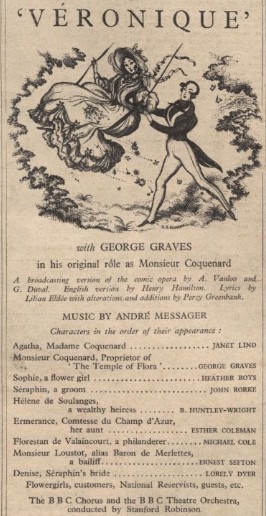
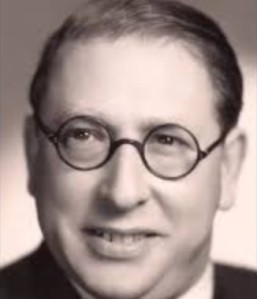 Louis Levy
Louis Levy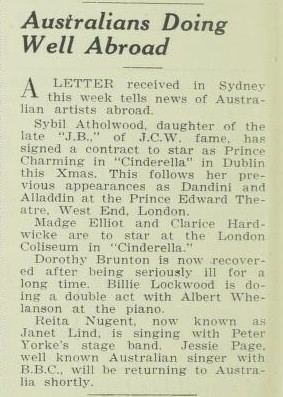
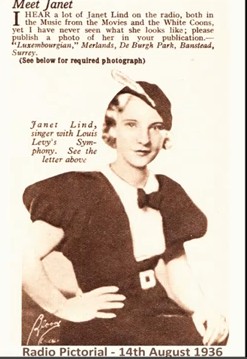



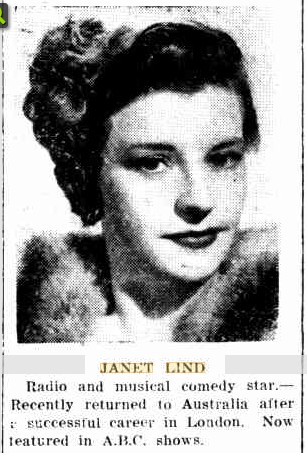

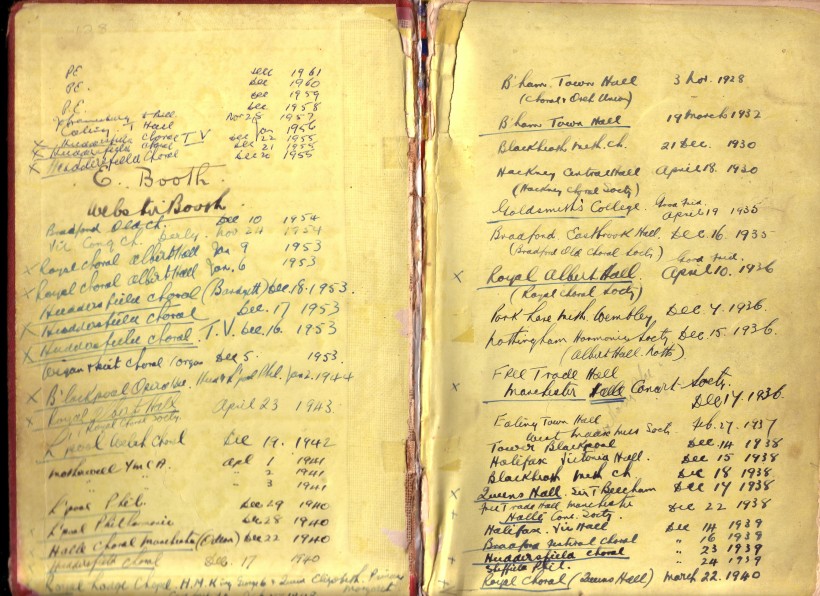

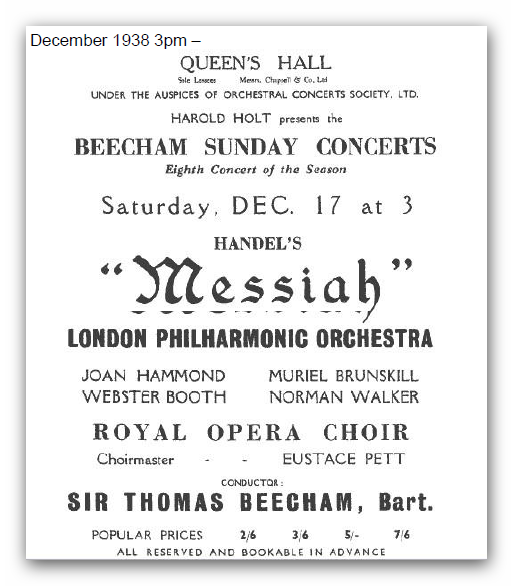
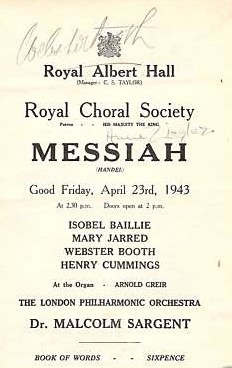
 1944 Blackpool Messiah
1944 Blackpool Messiah
.jpg)




















